On the afternoon of March 28, Humza Yousaf entered Bute House, the four-story Georgian townhouse in Edinburgh that serves as the official residence of the First Minister of Scotland. Earlier that day, he had been formally elected to that position by his peers in the Scottish Parliament, making him the first Muslim politician ever elected to lead a Western democracy, as well as the first non-white and youngest Scottish leader. He gazed up at a series of six portraits hanging in the stairwell and took in the enormity of his achievement. The first was of Donald Dewar, who became the nation’s inaugural First Minister in 1999 when the Scottish Parliament was created; the fifth showed Yousaf’s predecessor, Nicola Sturgeon, Scotland’s longest serving leader. The final portrait, of a grinning young man wearing a tartan tie, was his own.
“I really stand out because I look different,” Yousaf, 38, recalls when we meet nearby five months later at his office in St Andrew’s House, the headquarters of the Scottish government, for his first major interview with foreign media. “It was really emotional. I remember looking at it and thinking, almost whatever happens now … mine will always be the one that looks different.”
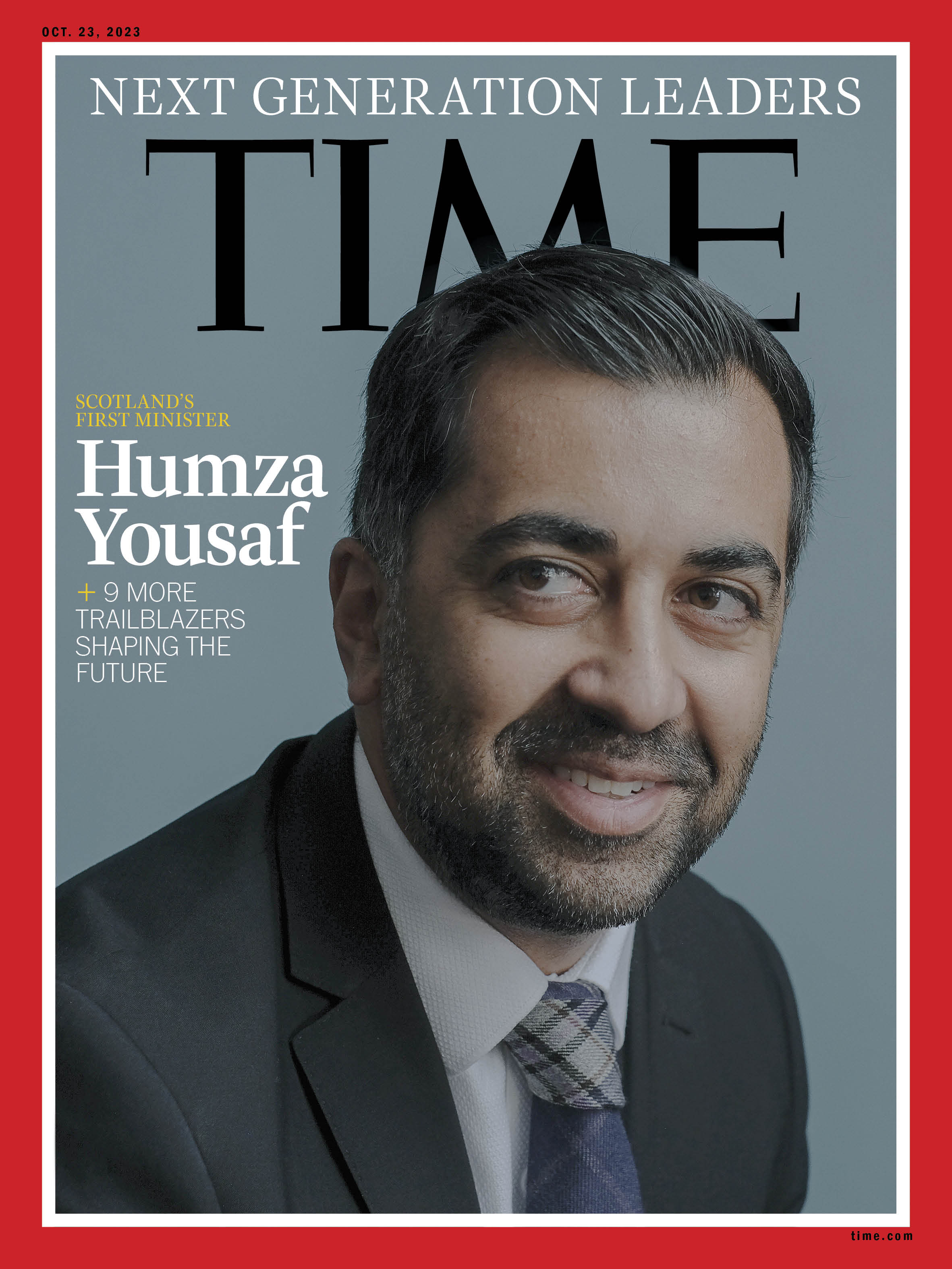
As proud as Yousaf is to have broken these barriers, he says it’s not something he dwells on—perhaps because there are too many other pressing issues competing for his attention. His early tenure has coincided with what many consider to be one of the most difficult periods in the 89-year history of the ruling separatist Scottish National Party. Since Sturgeon’s shock resignation in February—a decision that she attributed in part to burnout—the SNP has been plagued by an ongoing police investigation into its finances; internal divisions; and uncertainty over how to achieve its overriding objective: for Scotland to end its centuries-old union with the U.K.—which also includes England, Wales, and Northern Ireland—and become an independent country. The last time Scots had their say on independence, in a referendum in 2014, 55% voted against it. The British government—which established the autonomous Scottish legislature (as well as its powers over education, housing, and some taxation) in 1999 as part of a process known as devolution—is adamant that this was a once-in-a-generation vote, not to be repeated anytime soon.
Read More: 5 Takeaways from TIME’s Exclusive Interview With Scotland’s Humza Yousaf
Scotland is also struggling in other ways, from a cost-of-living crisis to overwhelmed public services. These are the issues that are likely to dominate the U.K.-wide general election expected next year, and the ones where Yousaf’s SNP, which has been in power in Scotland for 16 years, may now be vulnerable. The SNP is the largest party in the Scottish Parliament (and thus leads the Scottish government) and claims the majority of Scottish seats in the U.K. Parliament in Westminster. But some polls project that the next election could see the SNP’s presence in Westminster cut in half by the ascendant Labour Party, weakening its hand within Britain.
As Scotland’s leader, Yousaf therefore finds himself in the middle of a political Venn diagram. Although he won’t be facing a vote next year—the next Scottish Parliamentary election is in 2026—his authority within the party could come under strain if the SNP is seen to lose its electoral edge. “I think there’s a job to do for us in those 12 to 15 months to make sure we’re re-earning the trust of the people of Scotland,” he says. “It’s going to be a tough job.”
Yousaf may not be as easily recognizable as his predecessor, who prior to her resignation had been the face of Scottish politics for nearly a decade. But on a cloudy August afternoon in the Scottish seaside town of Largs, he is hard to miss. The First Minister is flanked by an entourage of people—among them SNP lawmakers and staff, photographers, and security personnel—as he makes his way along the seafront, ice cream cone in hand. He’s being interviewed by a local journalist who quizzes him on his plans to shore up the local economy and address longstanding issues such as unreliable ferry services. So engrossed is Yousaf in the conversation that he barely seems to register the drops of salted caramel falling onto his black dress shoes.
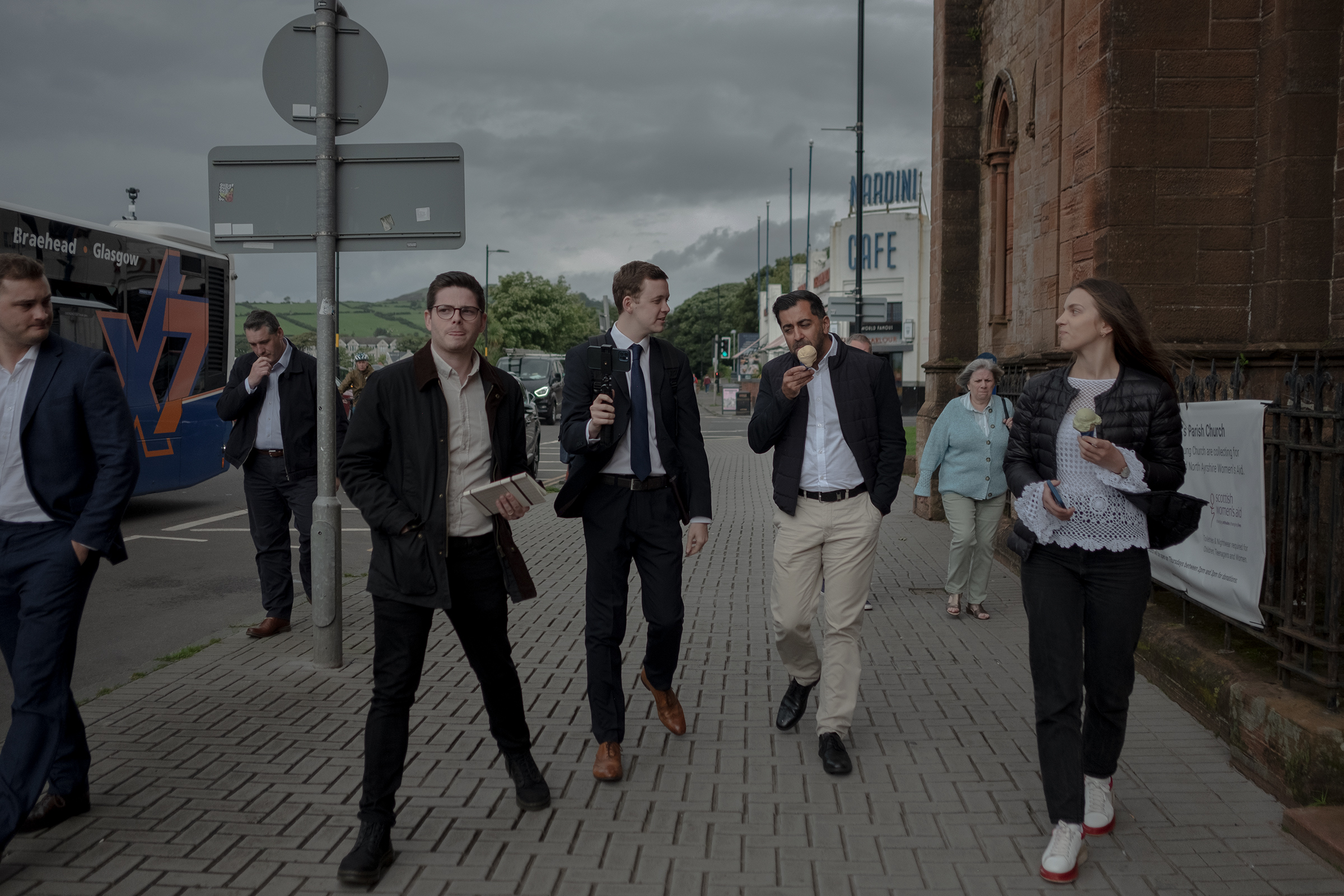
While most politicians used their summer recess to return to their constituencies or take a vacation, Yousaf spent his embarking on a “summer tour of independence” across Scotland in an apparent bid to boost SNP morale after a bruising few months in the media and the polls. As much as the tour was about rallying support for independence, it was also ostensibly about reintroducing Yousaf to the SNP faithful.
Not that Yousaf necessarily needs an introduction. He has spent more than a decade in frontline Scottish politics, and even longer within the broader separatist movement. Born in 1985 in Glasgow, Yousaf grew up at a time when the SNP was not the electoral force that it would become. But the party has long been central to his family life: his father Muzaffar Yousaf joined the SNP in 1972 after having immigrated to Scotland from Pakistan in the 1960s, and Humza is married to Nadia El-Nakla, a Scot of Palestinian descent who is a local SNP councillor in Dundee. (The couple have a 4-year-old daughter, and Yousaf is stepfather to a 14-year-old daughter from Nadia’s previous marriage.)
Yousaf says that despite being one of only two non-white pupils in his elementary school, he didn’t feel all that different from his peers, with two exceptions. The first was when, at the age of 6, he was referred to by one classmate as a Paki, a racist term hurled at South Asians; the second was in the aftermath of 9/11, when a 16-year-old Yousaf found himself bombarded by questions from friends about the perpetrators and their motives. “That, to me, was an important moment because my Muslim identity came to the fore—partly because people were questioning it, were asking about what it meant in terms of my loyalty to this country,” Yousaf says. It’s also the moment that he credits as a catalyst for his decision to pursue a career in politics—one that his father supported, but which made his mother Shaista Bhutta nervous. “She said, ‘What kind of job are you going to get in politics?’”
She wouldn’t need to wait long to find out. Within days of the SNP’s historic victory in the 2007 Scottish Parliament elections—during which Yousaf balanced campaigning for the SNP with studying for his final exams at the University of Glasgow, where he earned a degree in politics—he accepted a job as a parliamentary assistant for SNP lawmaker Bashir Ahmad, the first Muslim and non-white member of the Scottish Parliament. Four years later, Yousaf was elected to the Scottish Parliament and soon after kicked off his career of firsts, becoming the youngest lawmaker to join Scotland’s Cabinet at age 27 in 2012. He went on to serve variously as Transport, Justice, and Health Minister.
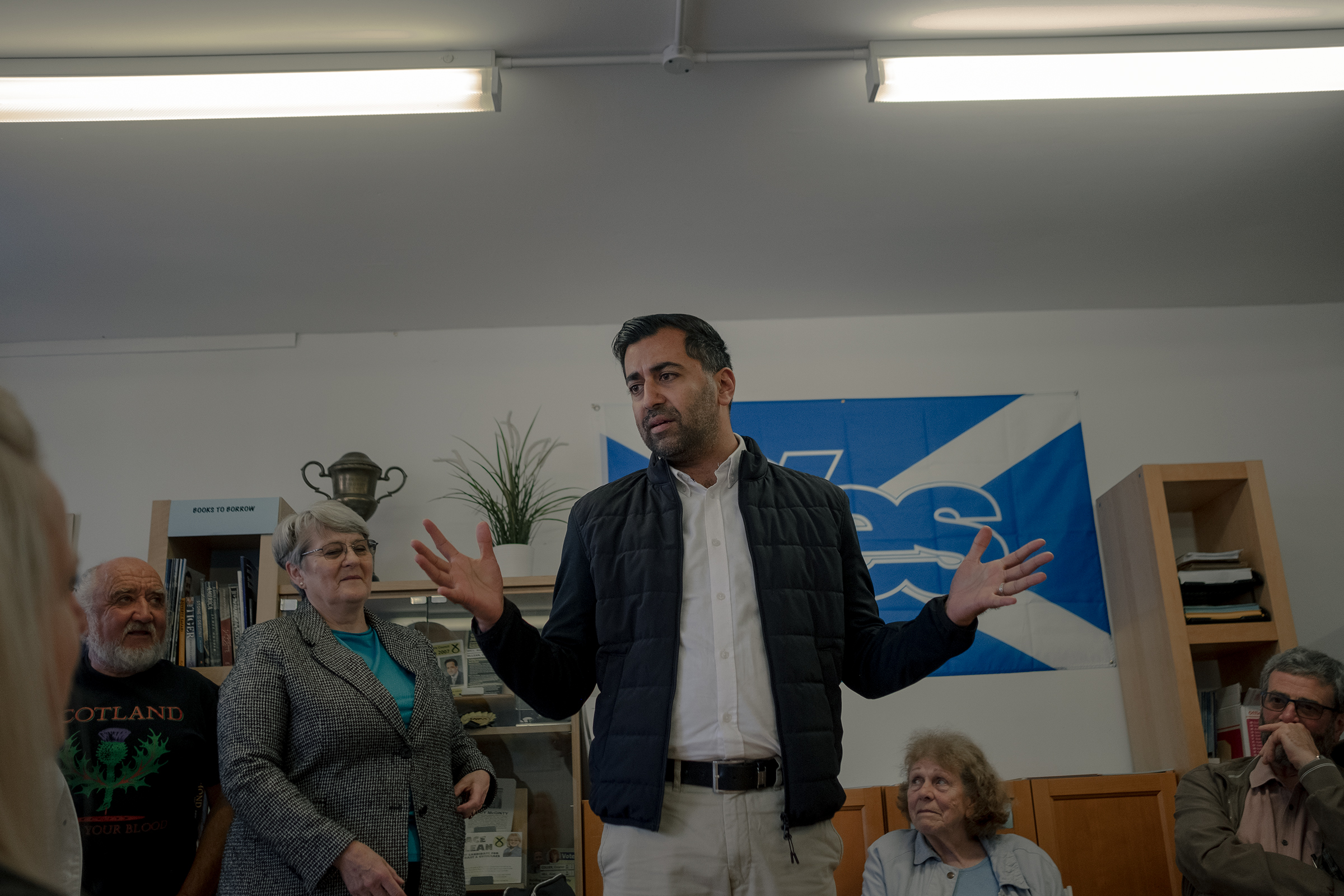
Yousaf’s extensive ministerial experience made him an early front runner in the race to succeed Sturgeon. As the “continuity candidate,” he was also seen by many SNP figures as best placed to continue her record of electoral success. But the party’s fortunes have since nose-dived. The investigation into its finances—which concerns allegations that the SNP misused £600,000 ($750,000) in donations earmarked to campaign for a second independence referendum and resulted in the dramatic arrest of Sturgeon, former SNP chief executive (and Sturgeon’s husband) Peter Murrell, and then-SNP treasurer Colin Beattie—continues to loom over the party. (All three were released without charge pending further investigation.) The fractious contest to replace Sturgeon also exposed internal divisions in a party once famed for its discipline. During a televised debate in March, SNP leadership rival Kate Forbes called into question her rival’s competence, telling Yousaf: “When you were Transport Minister, the trains were never on time; when you were Justice Minister, the police were strained to breaking point; and now, as Health Minister, we have record-high waiting times.” The party’s flagging in the polls has prompted some to question whether Yousaf is truly up to the task.
John Curtice, a polling expert and political scientist at the University of Strathclyde in Glasgow, says that Yousaf lacks the popularity of his predecessor, and perhaps some of her charisma. “He cannot command people in the way that Sturgeon could,” he says. Indeed, Yousaf claimed the support of just 52% of the party’s 72,000 dues-paying members, compared with Forbes’ 48%. “That was a terribly narrow result,” Curtice adds.
Alex Massie, an Edinburgh-based columnist for the Times of London, says that his authority within the party and the independence movement is somewhat diminished. “The SNP’s once formidable discipline and unity of purpose … has completely broken down,” he says.
SNP lawmakers who spoke with TIME have downplayed the scale of the party’s internal divisions, noting that leadership contests are inherently fraught. Yousaf described his detractors within the party, such as the SNP parliamentarian Fergus Ewing, as a minority. “In a party of our size, you’re going to have people like that,” he says. “But I’m pleased that the majority are absolutely right behind the party, the cause, and my leadership.”
But it is clearly an issue that has rattled the party—enough, at least, for Yousaf to make it a central part of his pitch to SNP supporters in the run up to next year’s U.K. election. Addressing a packed room of party activists on a visit to the SNP’s local office in Largs, Yousaf says that he “couldn’t give a flying monkey’s” who they voted for during the leadership contest—only that they put those differences aside in pursuit of the independence cause that unites them. “Divided parties just don’t win elections,” he warns.
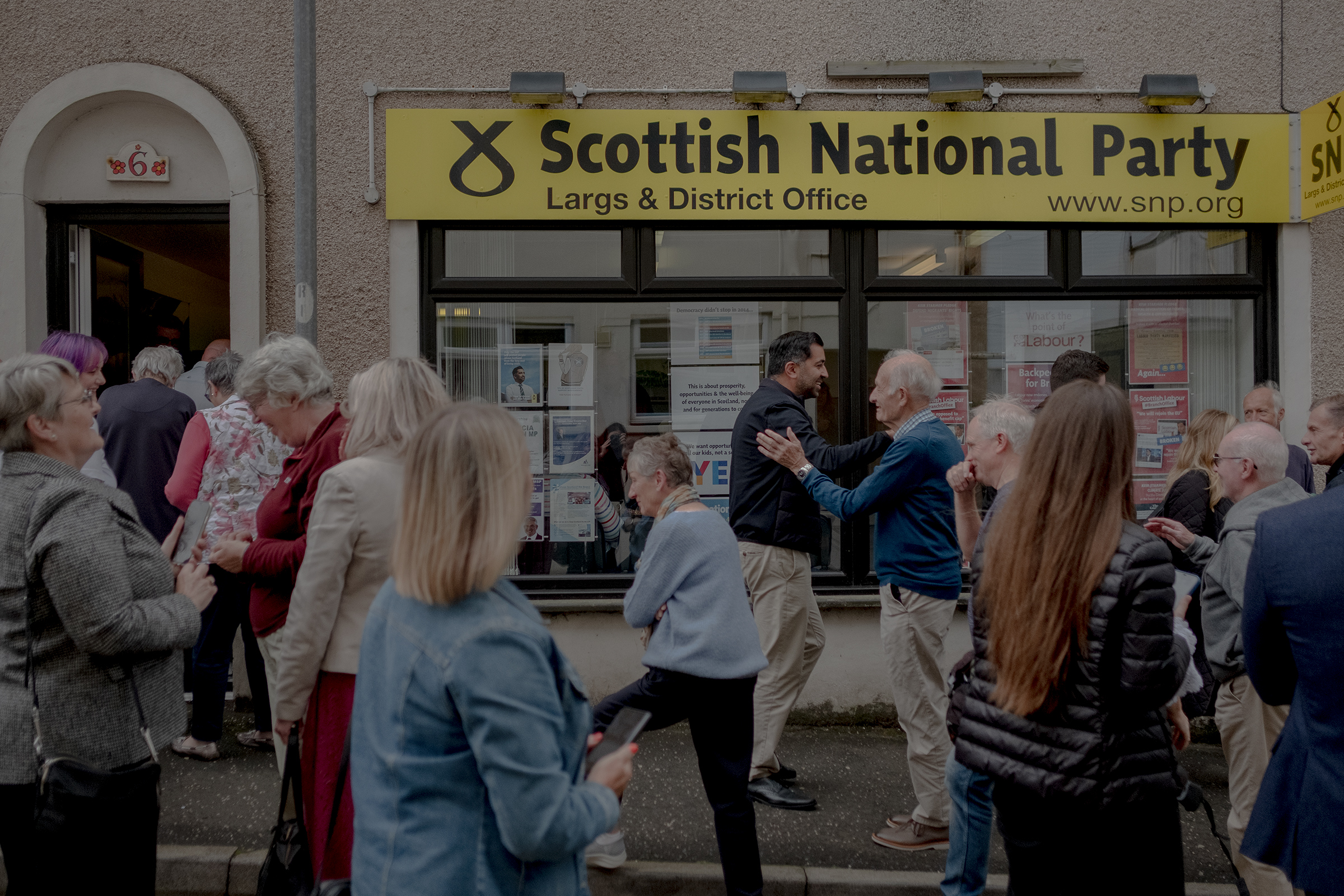
If Yousaf is worried about the SNP’s future, or his own, he doesn’t show it. Over the course of our two-hour meeting, he is relaxed, stealing sips of coffee and cracking jokes. During a photo shoot, while maintaining a solemn expression, he says, “I think I’m giving what my daughter would call ‘bombastic side eye.’”
But behind his jovial demeanor there is also a seriousness. As we settle into a pair of comfortable blue chairs in the next room in St Andrew’s House, away from the cameras, he acknowledges that it’s been a rocky start. “We’ve had five of the most difficult months that my party has probably faced in certainly its recent history,” he says. On this, even some of his toughest critics agree. Just days before our conversation, Forbes told an audience at Edinburgh’s annual Fringe Festival that she had “dodged a bullet” by losing to Yousaf, noting that “it would have been difficult for anybody.”
How, then, does he plan to turn things around? Principally, he says, by giving Scots a bold and progressive alternative to his Labour and Conservative opponents, which he describes as two sides of the same unionist coin. “I want to see the back of the Conservatives,” Yousaf says of U.K. Prime Minister Rishi Sunak’s party, whose right-wing politics has long served as an ideal contrast to the SNP’s vision for a social democratic Scotland. “At the same time, I despair at the lack of leadership shown by Sir Keir Starmer,” citing the center-left Labour Party leader’s unwillingness to reverse Conservative welfare policies or Brexit, which most Scots opposed. (The SNP advocates Scotland’s rejoining the E.U. as an independent country.) But unlike with the Conservatives, who Yousaf says have governed the U.K. with “incompetence and, at times, cruelty” over the past 13 years, Yousaf says the more left-leaning SNP would be willing to strike a deal with Labour to get the Conservatives out, albeit for a price: a fresh independence vote.
A hung Parliament—in which Labour doesn’t win enough seats to form a government on its own—would almost certainly be the best-case scenario for the SNP to try to force another referendum. (The U.K. Supreme Court ruled in 2022 that the Scottish government does not have the power to legislate for one on its own.) But current polls suggest Labour is on track to win a majority. “If the Labour Party does get an overall majority … until they reach a point where a U.K. government decides it’s in its interest to hold a [Scottish] referendum, it’s difficult to see how you get one,” Curtice says.
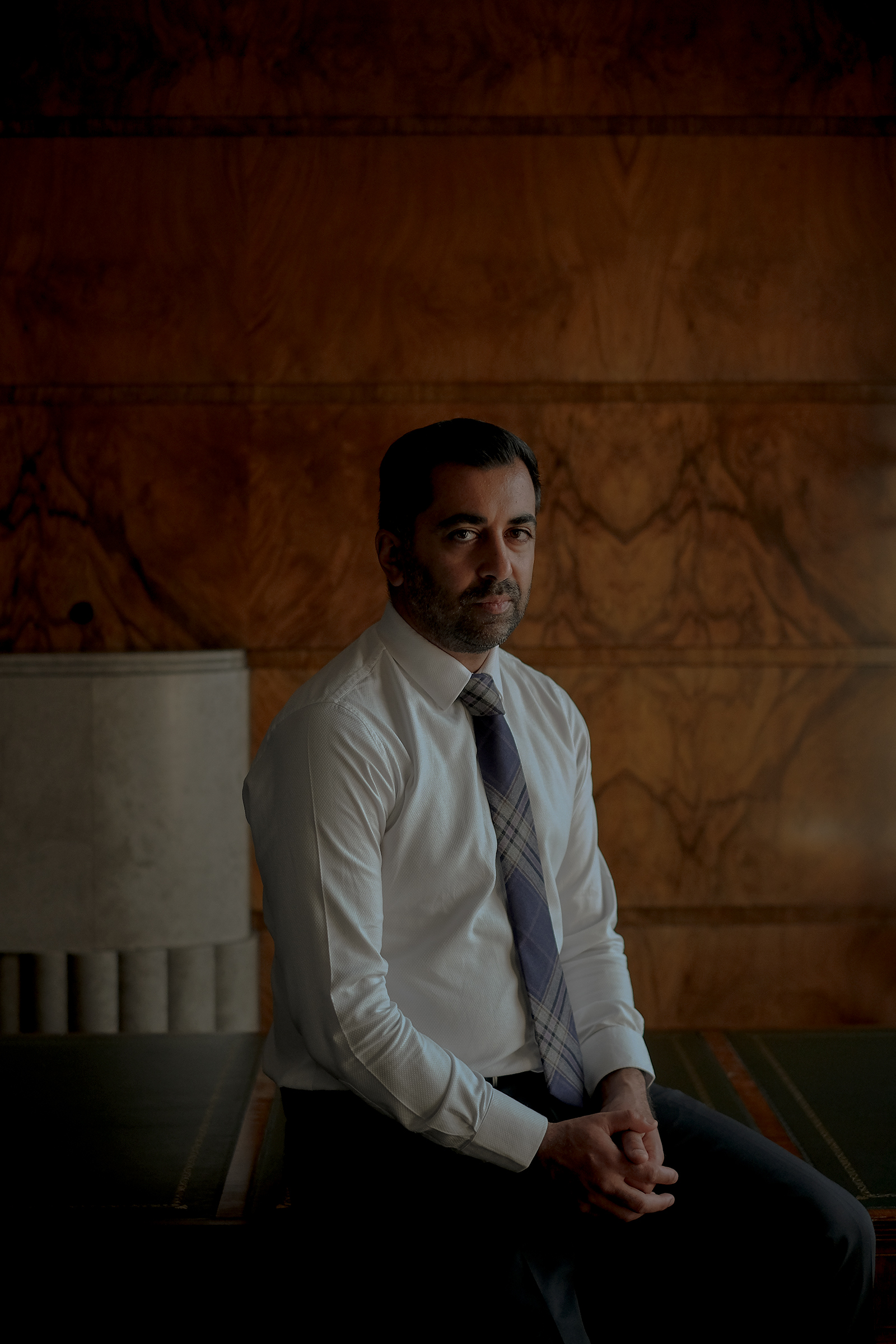
Still, Yousaf is doubling down on his independence pitch as the next U.K. election looms—not only because it’s the core policy that unites his big-tent party, but also because he sees it as the solution to the most pressing issues facing Scots today. On the economy, health care, education, and more, Scotland is faring poorly. Tens of thousands of Scots are languishing on waiting lists to receive treatment from the National Health Service. Scotland’s drug-related deaths, while on the decline, remain the worst in the U.K. and Europe. Its schools are lagging behind the rest of Britain, too. Other issues, such as disruptions to ferry services affecting Scottish island communities, continue to fester. Yousaf says that an independent Scotland would, of course, have challenges, but that it would also have avoided what he calls the “failures of Westminster,” including Britain’s departure from the E.U. and former U.K. Prime Minister Liz Truss’s decision in September 2022 to unveil a series of unfunded tax-cuts, which caused the British pound to crash. Furthermore, Yousaf says, “we would have the levers to be able to pull whenever we face an economic shock, much in the way other independent European countries of our size have been able to do.”
But if the SNP can’t be seen to deliver good governance on matters within its control, even within the confines of devolution, it may struggle to convince Scots that they would be better served outside it. Support for independence today remains at a steady 48%, but Yousaf believes that there is a “consistent, sustained majority” to be built. And if the SNP wins the most seats in Scotland at the next U.K. election, Yousaf says he’ll take that as a mandate to press Westminster for another vote.
When I point out that no British Prime Minister will want to be remembered as the one who helped break up the U.K., he concedes that the more popular the prospect of independence becomes, the less likely they would be willing to grant a referendum. “But they shouldn’t be scared,” he says of whoever forms the next government. “They should give the people the choice and the voice that they have demanded over the say of their own future, and that’s what I’m going to work hard on to try to build support for.”
Yet that may be an academic question at this stage. A June survey by British pollster YouGov found that when asked to list their top priorities, Scots chose health care, the economy, and education. Independence came in seventh. “People are exhausted after 10 years of constitutional politics, both in terms of Scottish independence but also Brexit; then the COVID years, now high inflation and cost of living,” Massie says.
It’s a concern to which Yousaf, tasked with defending the SNP’s 16-year-record in government, says he’s attuned. After that long in government, “it’s inevitable that you make mistakes.”
A week after we spoke, Yousaf led thousands on an independence march through the streets of Edinburgh, where he framed the cost-of-living crisis as a “cost-of-union crisis.” Whether that message will be enough to keep voters onside remains to be seen. But he is staking his historic leadership on it. “Being attached to this unequal union,” he says, “is what’s holding us back.”
- How Nayib Bukele’s ‘Iron Fist’ Has Transformed El Salvador
- What Makes a Friendship Last Forever?
- How to Read Political Polls Like a Pro
- Long COVID Looks Different in Kids
- What a $129 Frying Pan Says About America’s Eating Habits
- How ‘Friendshoring’ Made Southeast Asia Pivotal to the AI Revolution
- Column: Your Cynicism Isn’t Helping Anybody
- The 32 Most Anticipated Books of Fall 2024